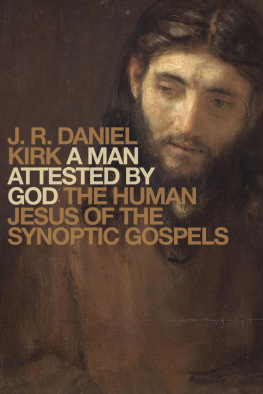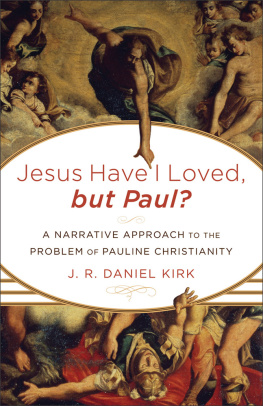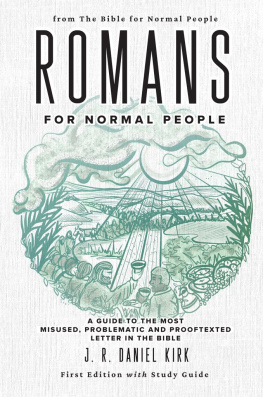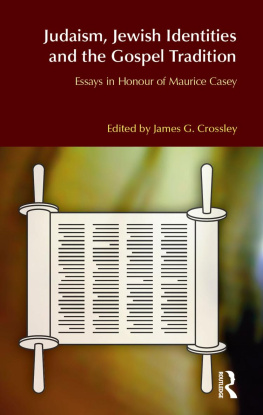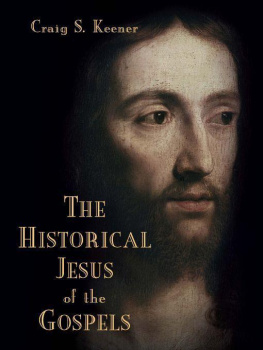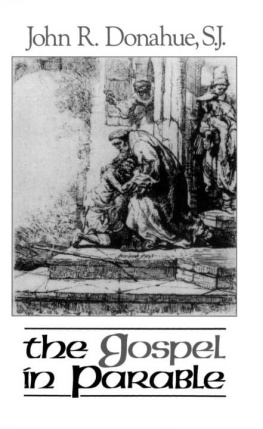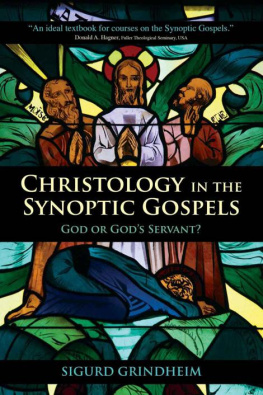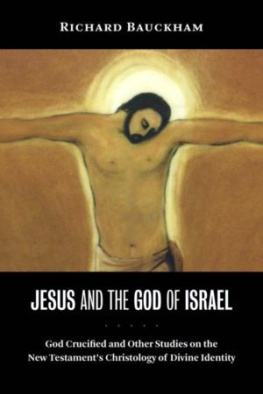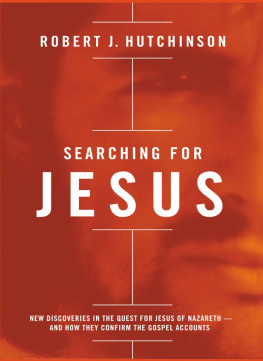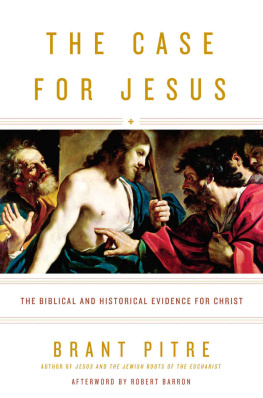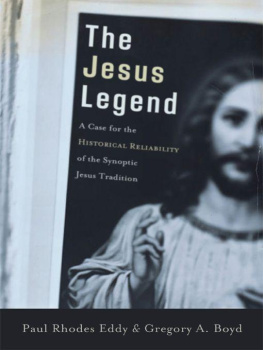A MAN ATTESTED BY GOD
The Human Jesus of the Synoptic Gospels
J. R. Daniel Kirk
WILLIAM B. EERDMANS PUBLISHING COMPANY
GRAND RAPIDS, MICHIGAN
Wm. B. Eerdmans Publishing Co.
2140 Oak Industrial Drive N.E., Grand Rapids, Michigan 49505
www.eerdmans.com
2016 J. R. Daniel Kirk
All rights reserved
Published 2016
22 21 20 19 18 17 161 2 3 4 5 6 7
ISBN 978-0-8028-6795-7
eISBN 978-1-4674-4616-7
Library of Congress Cataloging-in-Publication Data
Names: Kirk, J. R. Daniel, author.
Title: A man attested by God : the human Jesus of the synoptic gospels / J. R. Daniel Kirk.
Description: Grand Rapids : Eerdmans Publishing Company, 2016. | Includes bibliographical references.
Identifiers: LCCN 2016013963 | ISBN 9780802867957 (cloth : alk. paper)
Subjects: LCSH: Synoptic problem. | Jesus Christ.
Classification: LCC BS2555.52 .K55 2016 | DDC 232/.8dc23
LC record available at https://lccn.loc.gov/2016013963
For Laura, Cora Marie, and Eliot
The others show him as a man: they gave glory to God who had given such authority to men (Matt 9:8); but John only says that he is God: and the Word was God.
Thomas Aquinas, Commentary on John 1.67
Contents
One of the most popular arguments for the divinity of Jesus comes from the pen of C. S. Lewis in his book Mere Christianity. In the final paragraph of a section entitled The Shocking Alternative, he claims that Jesus can only be understood as liar, lunatic, or lord. Lord in this case is viewed as equivalent to Lord and God. As a young Christian I found that this set of alternatives squared well with two things: (1) the understanding of Christianity I had then, that what lies at the center of everything is belief in the divinity of Jesus, and (2) the Jesus whom I met in the pages of John, who often made the sorts of outrageous self-referential claims that I can only imagine are the ones Lewis had in mind.
Where this framework of coming to terms with Jesus left me short, however, was in my encounter with the Jesus who confronted me in the pages of the Synoptic Gospels. This Jesus was not Lewiss despised moral teacher (full stop). But neither did he say very many things that left the reader with the choice between this guy is a lunatic on the level with someone who thinks he is a poached egg and this is none other than the Lord God. In short, a divine Jesus whose mission entailed disclosure of a divine identity did not help me make sense of the stories told by Matthew, Mark, or Luke.
The tide began to turn for me at seminary, where a strong tradition of reading the whole Bible diachronically had created a deep sense among the faculty that humanity as represented in Adam, Israel, and David was crucial to the larger biblical narrative. The Jesus story began to take on importance not as demonstrating that Jesus the human was just a better teacher than most, or as showing that the divine had to take on flesh simply so that he could die, but as depicting Jesus playing the part the story had always lacked: a human who fulfilled the purpose of primal humanity to not only rule the world for God, but also to do so as a faithful, obedient son.
Such notions laid the foundation for the following years, in which I read and began to understand the stories of the Synoptic Gospels with very different lenses than the ones I had tried on in my youth: yes, Jesus is the Christ; but no, this does not mean that he is being depicted as divine.
However, just as I was growing into what I had learned and become convinced of it seemed that the tide shifted, and early divine Christology became the word of the day for those readers interested in the theological texture of scripture. Arguments to the effect that, whatever might be the Christological diversity within the New Testament writings, all early Christians showed that they identified Jesus with God or as God left me wondering if the coherence I had found through a human Jesus was going to be swept away. In the face of this shifting tide of scholarship, the current study is an attempt to reassert the centrality of Jesus as a particular kind of human as the operative Christological rubric for the Synoptic Gospels a reading that has, to my mind, allowed the stories to find a coherence they otherwise lack and to claim their own voices amid the varied New Testament witness to the identity of Jesus.
This book has been a work in process for almost seven years now. No project of such duration could have endured without the encouragement and support of colleagues, family, and friends. I am grateful for Fuller Seminarys generous sabbatical policy, which provided me with two opportunities to be free from teaching responsibilities in order to be devoted to this book. I am thankful also to the students who have endured more high human Christology in Gospels class than they bargained for. A number of people read portions of the manuscript, taking on a burden that demonstrates true collegiality and friendship: Michael Bird, Sam Boyd, Craig Carpenter, Justin Dombrowski, Crispin Fletcher-Louis, John Goldingay, Larry Hurtado, Nathan Mastnjak, James McGrath, David Vinson, and Tim Wardle. Special thanks go out to Justin, Stephen, Judy, Mark, Love, David, Jim, Mark, Tim, Keoke, Steve, David, Jer, and countless others who have believed in the value of my work and encouraged me along the way. Most of all I am thankful for Laura, Cora Marie, and Eliot, whose love for me and in me allows me to do my work with the freedom that comes from knowing what truly matters most.

. C. S. Lewis, Mere Christianity (New York: Macmillan, 1952), 55-56.
. Dan McCartney, Ecce Homo: The Coming of the Kingdom as the Restoration of Human Vicegerency, WTJ 56 (1994): 1-21.
ANCIENT SOURCES
| 1 En. | 1 Enoch |
| 11QMelch | 11QMelchizedek |
| 2 Apoc. Bar. | 2 Baruch (Syriac Apocalypse) |
| 3 En. | 3 Enoch |
| 3 Regn. | Dio Chrysostom, De regno iii |
| Ant. | Josephus, Antiquities of the Jews |
| Bell civ. | Caesar, Bellum civile |
| Hist. | Dio Cassius, History of Rome |
| Ezek. Trag. | Ezekiel the Tragedian |
| Gen. Rab. | Genesis Rabbah |
| Jub. | Jubilees |
| J.W. | Josephus, Jewish War |
| L.A.E. | Life of Adam and Eve |
| m. | Mishnah |
| Mos. | Philo, De vita Mosis |
| Opif. | Philo, De opificio mundi |
| Pesiq. Rab. | Pesiqta Rabbati |
| Pesiq. Rab Kah. | Pesiqta de Rab Kahana |
| Praem. | Philo, De praemiis et poenis |
| Pss. Sol. | Psalms of Solomon |
| Prob. | Philo, Quod omnis probus liber sit |
| Rep. | Plato, Republic |
| Rom. Ant. | Dionysius of Halicarnassus, Roman Antiquities |
| Sacr. | Philo, De sacrificiis Abelis et Caini |
| Somn. | Philo, De somniis |
| T. Ab. | Testament of Abraham |
| T. Lev. | Testament of Levi |
| Tg. Ps.-J. | Targum Pseudo-Jonathan |
| Tg. Neof. | Targum Neofiti |

